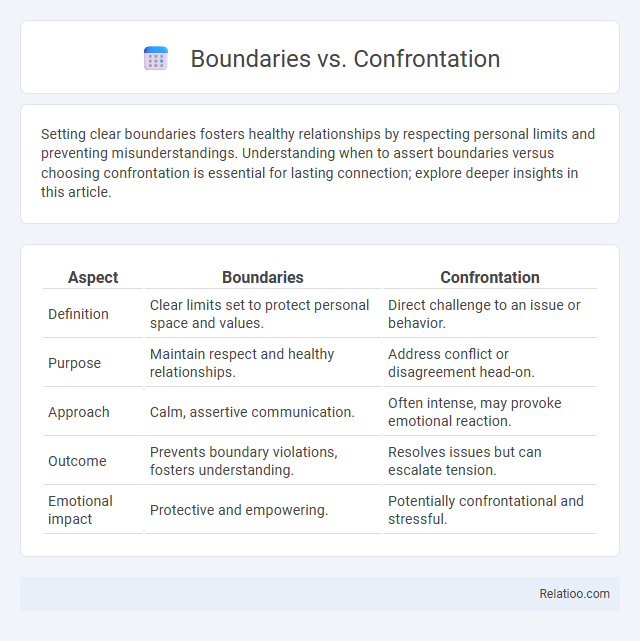Setting clear boundaries fosters healthy relationships by respecting personal limits and preventing misunderstandings. Understanding when to assert boundaries versus choosing confrontation is essential for lasting connection; explore deeper insights in this article.
Table of Comparison
| Aspect | Boundaries | Confrontation |
|---|---|---|
| Definition | Clear limits set to protect personal space and values. | Direct challenge to an issue or behavior. |
| Purpose | Maintain respect and healthy relationships. | Address conflict or disagreement head-on. |
| Approach | Calm, assertive communication. | Often intense, may provoke emotional reaction. |
| Outcome | Prevents boundary violations, fosters understanding. | Resolves issues but can escalate tension. |
| Emotional impact | Protective and empowering. | Potentially confrontational and stressful. |
Understanding Boundaries: Definition and Importance
Understanding boundaries involves recognizing your personal limits and communicating them clearly to protect your emotional well-being and relationships. Boundaries help prevent unnecessary confrontation by setting expectations and promoting respect, reducing misunderstandings and conflicts. Establishing healthy boundaries empowers you to manage interactions effectively and fosters a balanced dynamic without resorting to confrontational behavior.
What Is Confrontation? Key Characteristics
Confrontation involves directly addressing conflicts or disagreements with clear and assertive communication, aiming to resolve issues through open dialogue. Key characteristics of confrontation include expressing feelings honestly, maintaining respect for all parties involved, and focusing on problem-solving rather than personal attacks. Effective confrontation helps establish boundaries by clarifying expectations and reinforcing limits in relationships.
Boundaries vs Confrontation: Core Differences
Boundaries establish clear personal limits that define acceptable behavior, promoting respect and emotional safety in relationships, while confrontation involves directly addressing conflicts or challenges, often requiring immediate dialogue or action. Your ability to set boundaries prevents unnecessary confrontations by proactively managing expectations, whereas confrontation focuses on resolving issues that have already surfaced. Understanding these core differences helps you maintain healthy interactions by balancing prevention through boundaries with resolution through confrontation.
When to Set Boundaries in Relationships
Setting boundaries in relationships is essential when personal values, emotional needs, or comfort levels are consistently overlooked or disrespected, signaling the need for clearer limits to maintain healthy interactions. Boundaries help prevent escalating conflicts and reduce the frequency of confrontations by establishing mutual respect and understanding between partners or friends. Recognizing when to set boundaries involves noticing patterns of repeated discomfort, emotional exhaustion, or resentment that indicate unresolved issues requiring proactive communication rather than reactive confrontation.
Healthy Confrontation: When and How to Approach It
Healthy confrontation involves setting clear boundaries to address conflicts constructively without escalating tension. It requires recognizing the appropriate timing and context to engage in open, respectful dialogue that prioritizes problem-solving over blame. Approaching confrontation with empathy and active listening fosters mutual understanding and strengthens relationships.
Psychological Impact: Boundaries vs Confrontation
Setting boundaries promotes psychological well-being by fostering a sense of control and reducing stress, whereas confrontation often triggers anxiety and defensiveness, potentially escalating emotional tension. Boundaries enhance emotional regulation and self-respect by clearly defining personal limits, while confrontation challenges these limits, sometimes leading to conflict and psychological discomfort. Understanding the psychological impact of boundaries versus confrontation helps individuals navigate interpersonal relationships with greater resilience and emotional stability.
Communication Strategies for Assertive Boundary Setting
Effective communication strategies for assertive boundary setting emphasize clarity, directness, and respect to prevent misunderstandings and reduce confrontation. Employing "I" statements and consistent verbal and nonverbal cues helps convey personal limits without escalating conflicts. Distinguishing boundaries from confrontation encourages calm dialogue, fostering mutual respect and cooperation in personal and professional relationships.
Common Misconceptions About Boundaries and Confrontation
Common misconceptions about boundaries and confrontation often confuse setting limits with aggressive behavior, leading many individuals to avoid necessary discussions. You may believe that establishing boundaries means creating conflict, but healthy boundaries clarify expectations and protect your well-being without hostility. Understanding the difference helps promote respectful communication and reduces unnecessary confrontations in personal and professional relationships.
Real-Life Scenarios: Applying Boundaries and Confrontation
Establishing clear boundaries in real-life scenarios ensures personal space and emotional well-being, preventing misunderstandings and conflicts. When boundaries are crossed, confrontation serves as a direct method to address issues, fostering open communication and resolution. Effective application of both boundaries and confrontation enhances relationship dynamics by promoting respect and mutual understanding.
Building Healthy Relationships: Striking the Right Balance
Establishing clear boundaries is essential for building healthy relationships, fostering mutual respect and understanding while preventing conflicts from escalating. You can cultivate open communication and empathy to address confrontations constructively, ensuring issues are resolved without damaging trust. Striking the right balance between setting boundaries and managing confrontations leads to stronger, more resilient connections.

Infographic: Boundaries vs Confrontation
 relatioo.com
relatioo.com